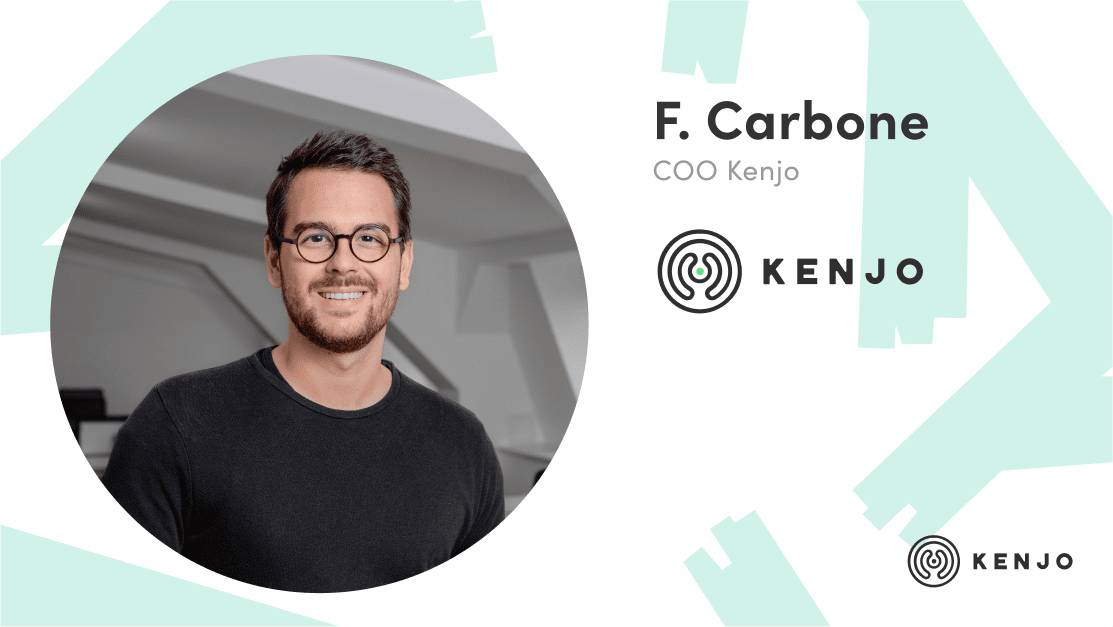How HR software can boost employee motivation

In the wake of the coronavirus pandemic, work patterns and the way employees relate to each other have changed completely. In fact, maintaining employee engagement has become even more difficult, with workers reporting higher levels of stress and burnout, according to the latest Gallup consultancy survey.
In this sense, HR teams face a number of challenges to keep staff satisfaction high and provide a suitable working environment, whether in a telecommuting or on-site situation or a hybrid model of both.
Recently, Francesco Carbone, COO of Kenjo, was the guest on a new episode of The State Of Work podcast, from Berlin-based startup Lano. This company, specialised in labour compliance and payment management when recruiting remotely, shares a common mission with Kenjo, to simplify, facilitate and digitise the work of the HR department.
In this conversation, podcast hosts Maddie Duke and Francesco talk about the importance of measuring employee engagement, what companies do to create a positive company culture, team building events and how Kenjo uses technology to facilitate these processes in Europe and Latin America, in particular by automating HR tasks with its all-in-one software.
We're excited to hear what they have to say about the benefits and limitations of working from home and flexible working.
How long have you been working at Kenjo and what is your background there?
I was one of Kenjo's first clients. I was probably client number three. At the time, I was leading a team of employees in another startup that was using Kenjo's software, and I was giving an incredible amount of feedback. David, our CEO and founder, was like, "Wow, this guy is so good at complaining. We should bring him in, so he can complain up close and personal." Because that's how a complaint turns into real feedback.
That's how I came to Kenjo. Since then, we have evolved from a normal HR tool to a complete solution that also includes corporate culture features such as:
- employee Satisfaction Surveys,
- performance reviews,
- shoutouts,
- meetings,
- goal setting and a lot of other features.
To sum up, we basically improve the whole interaction between employers and employees and get all the unnecessary noise out of the way. We do that by having great software that facilitates certain processes in HR. Of course, we also want to create awareness among these companies with the software. We now have almost 300 customers from small and medium-sized enterprises - mainly in the DACH region, in Spain and in some Latin American countries.
How have HR departments evolved in parallel with the changes during the pandemic?
The Coronavirus crisis acted like a fire accelerant for digitalisation. This is exactly why we are now receiving many enquiries from traditional companies such as craft businesses, which are asking how they can best support their employees. We see great potential here.
This big change in the personnel services industry in a comparatively small market speaks for itself. Currently, only a fraction of HR software covers the market in Europe.
What are the benefits of HR automation processes in daily practice?
In my old job, I had to hire thirty new employees in half a year. Of course, that was a huge challenge. With HR software, you can do things much faster and more efficiently as an HR manager than you could without the support of software.
However, it also eradicates jobs, mostly jobs that are quite boring. That's just the way the whole software job market works. For example, my wife used to work at Wayfair as an HR coordinator, where she was responsible for making appointments. I asked her if she knew about the Calendly scheduling software and why she didn't use it.
When you get a call with a human voice that might even be nice to you, that is of course different from a link. But at the end of the day, the effort is relatively small compared to the result. It's not fun to do a job like that all day. At the end of the day, it's also about the fact that HR software can eliminate repetitive workflows.
My wife now works for a company with digitised tools, so she has time to deal with diversity and inclusion and things like that. There was no room for that before, there was no budget and no interest. Thanks to HR software, we are shifting these monotonous tasks towards sustainability, diversity and all these, in my opinion, are much more important and significant issues.
Can HR software also help to eliminate personal bias and unconscious choices?
That is an interesting observation. I think eliminating bias and prejudice is impossible. Even if emails are written a certain way, that can be a certain trigger for certain people. HR software can help reduce this bias here.
By the way, we held an interesting webinar on the topic of unconscious bias and measures to eliminate it. The recorded version is available here.
How does Kenjo's HR software support its clients and their employees in their personal and professional development?
If I start from a business-oriented approach, I first ask about the importance of employee development. The simple answer here is that continuously trained employees work better and produce more value for their company.
In some companies, certain behavioural patterns from the past are still deeply rooted. This prevents them from making excellent decisions. The question of how to give employees the space they need to develop is based precisely on trust.
A leader needs the ability to trust others and must first trust himself. Financial resources do not matter, as they can be provided relatively easily. Actually creating space and time for development opportunities that are secured by each individual leader, on the other hand, is more difficult.
How easy is it to rely on hard numbers in everyday life? If you have made half a million Euros in turnover, although your goal was actually only 450 Euros, then it doesn't matter what happened, after all you are the big winner of the race.
But if you have set yourself the goal of, for example, the best corporate culture with a high ENPS and then the revenues don't add up, that's a problem. After all, everything is linked to the hierarchy of needs - even in companies there is a hierarchy of needs. Without money to survive, we as a company will never be able to tackle ambitious projects such as employee training or a positive environmental balance sheet, etc. There is no patent remedy for this. Companies need to focus on the goals they want to achieve.
As a leader in the boardroom, this way of living values is in some ways unique. Could this also be applied to employee motivation and satisfaction?
My theory is: treat people well and they will treat your company well.
There is a lot of research on this. In the sixties, the US economist Peter Drucker started it, then in Germany Fritjof Bergmann spoke about New Work. Simon Sinek is one of the leading minds of the New Work movement today. By the way, the founder of wefox, Julian Teicke, gave a wonderful interview on what the future of work will look like, which I definitely recommend.
For twenty years, Gallup surveys have been coming up with the same results over and over again: employee behaviour hasn't changed - their needs may have changed somewhat, but companies aren't addressing them. On average, not even thirty per cent of employees feel truly addressed and motivated. This untapped potential is not being exploited.
How do you measure factors like motivation and working atmosphere?
If the working atmosphere is not right, employees usually complain that this and that is not working properly. And it is always the HR department's fault.
The natural reaction here seems to be wild actionism, along the lines of: let's introduce XYZ to solve all the problems. However, you can't tackle a bunch of problems with a single measure.
You have to find the main culprit behind negative corporate cultures. The best method I have seen so far is essentially an employee survey. So far, I have conducted and analysed workplace climate surveys with about ten companies.
One of the biggest problems companies have is that they work on the wrong issues. For example, if HR departments only focus on salary increases, they still find that employees are not happier. Salary can be about a lack of recognition, for example.
For example, let's imagine a 50-year-old skilled worker in a factory who reports to a 30-year-old who has just completed an MBA. The 50-year-old feels unappreciated. What does he do then? He goes to his supervisor and says, "I don't feel valued enough. Can you please give me more positive feedback?" Instead, he asks for more salary and may even get it. But the problem is still not solved.
However, we can send him weekly quantitative employee satisfaction surveys that he can fill out anonymously. At Kenjo, for example, we offer a free employee survey to every one of our clients. This is because we believe it is the cornerstone to becoming a better employer.
What is your strategy for hiring and managing a team that works across two different countries?
It's a mix of two different cultures that can develop independently but are also united by a common goal. To be honest, we were very lucky to be born and raised bilingual. We started from day one as a company from Madrid and Berlin. I can relate to that. I am half German and half Italian. That's also the world we live in nowadays.
Of course, the HR manager from Madrid is part of the HR team. We meet weekly with the international HR team, exchange ideas and work closely together.The process is the same everywhere. We have mandatory time slots and interviews with me and also with David as CEO, at least until we grow to 100 employees. At the moment we have around 65 employees. In this way, we have the same approach in both countries and give the same attention to all new employees.
We also organise regular yoga meditation classes, which are led by our head of client services, as she is a certified yoga teacher. Our staff team has created the Kenjonita's Got Talent online event series, where we have hosted cooking seminars and cocktail sessions.
Thank you Francesco for this interesting interview!
About State Of Work
The State of Work Podcast is available wherever you listen to podcasts. You can also find it on Instagram or Twitter. For more information and the full podcast, please visit podcast.lano.io.
Kenjo helps HR professionals become a strategic partner in their organisation, helping employees realise their full potential and setting businesses on the path to success. Try our employee survey feature for free now.


